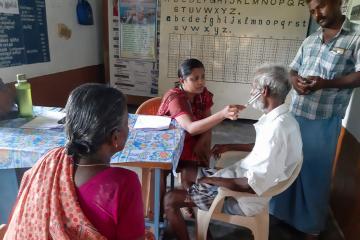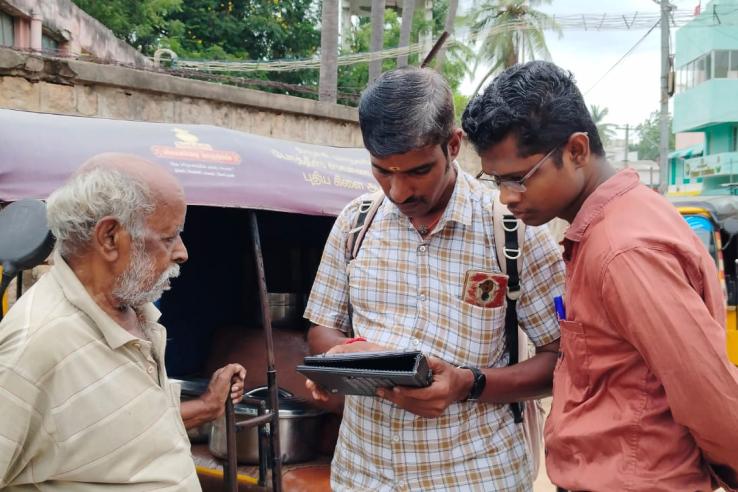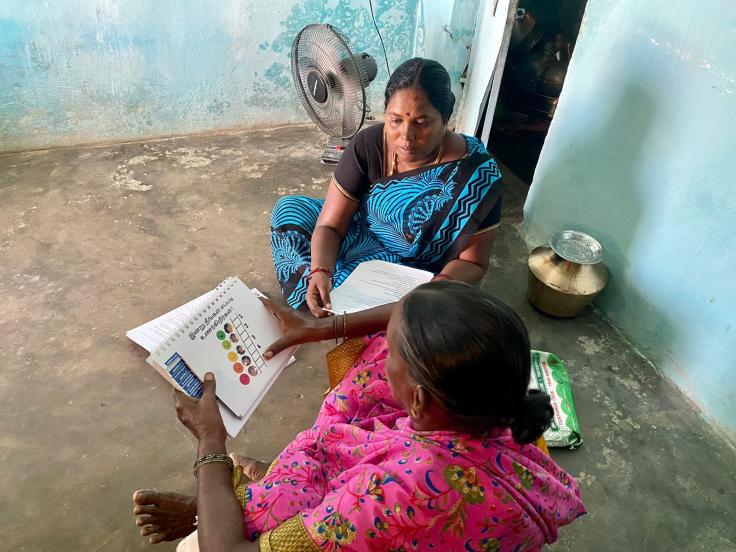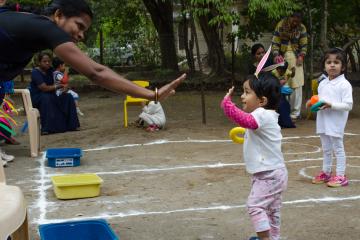
What does it take to sustain a government-researcher partnership? Lessons from Tamil Nadu

J-PAL South Asia has been working with the Government of Tamil Nadu, India for many years to inform policy decisions with rigorous research. One of our longest-standing research projects involves a multi-year survey of elderly people residing in the state to better understand their needs and how the government can best support them.
Globally, the elderly population is growing at an unprecedented rate, with no clear signs of slowing down. Nearly two decades from now, 1.6 billion people will be aged 65 or older across the world. The World Health Organization estimates that 80 percent of the elderly will reside in low-and middle-income nations in 2050. India is no exception to this global trend. By 2050, the country will be home to 347 million people who will be 60 years or older. These trends signal an urgent need for policies tailored to the needs of the ever-growing elderly population.
To ensure policies address the challenges faced by the elderly, it is crucial to study and understand their living conditions. In Tamil Nadu, the government has been doing just that. Since 2016, the government has been jointly working with researchers affiliated with J-PAL to study a cohort of 6,000 elderly residing in Tamil Nadu, which has the second-highest share of elderly in the country.
This eight-year survey will enter its final phase in 2026. By spotlighting problems faced by those 55 years of age and older, this survey has been crucial in guiding policy investments to support the elderly and has also set the foundation for further evaluations to safeguard elderly well-being in Tamil Nadu.
Over the years, our team has identified some systemic learnings to build a holistic and long-standing partnership with a state government. This blog aims to distill key lessons that may be useful, particularly for researchers looking to establish an effective engagement with a government partner.
But before diving into the lessons, a quick overview of this partnership's genesis, and the survey's early findings.
Studying elderly well-being in Tamil Nadu
A decade ago, the Tamil Nadu government started engaging with the J-PAL South Asia team along with researchers affiliated with J-PAL. The goal was clear: to find answers to key policy questions and explore pathways to test potential innovative solutions—and drive a culture of evidence-informed policymaking, a trend that has now gained momentum worldwide. The conversations soon matured into a multi-department strategic partnership between J-PAL South Asia and the Government of Tamil Nadu, sealed in 2014.
A few years later, the government initiated the elderly panel survey in collaboration with multiple state departments in Tamil Nadu (including the Department of Economics and Statistics, Directorate of Public Health) and J-PAL South Asia. It was modeled along the lines of the Health and Retirement Survey (HRS) of the US and the Longitudinal Ageing Study in India (LASI). The study is being led by Nobel Laureates and J-PAL co-founders Abhijit Banerjee (MIT) and Esther Duflo (MIT), along with Frank Schilbach (MIT), Madeline McKelway (Dartmouth College), Garima Sharma (Northwestern University)1, and Girija Vaidyanathan (retired officer of the Indian Administrative Services).

While not a randomized evaluation in itself, the study findings have enabled a deeper understanding of the challenges faced by the elderly, and have thereby paved the way for co-designing and testing interventions to address the same using randomized evaluations.
Early findings paint a troubling picture of the elderly in Tamil Nadu. In India, elderly individuals may often be thought to live with their adult children, but the survey revealed that one in seven elderly individuals in the state live alone, with women making up the majority. Many of these individuals are grappling with poverty, depression, and a range of health conditions, including hypertension, diabetes, and cognitive disorders.
The Tamil Nadu government referred to the survey findings to launch, refine and strengthen their programs targeted at the elderly population. In 2023, they increased old age pension (OAP) amounts and launched a Senior Citizen Policy. In 2024, the Thayumanavar Scheme, introduced to help lift the extremely poor out of poverty, lays a special emphasis on the elderly living alone.
Testing new approaches
The government has been particularly cognizant of the mental health challenges faced by the elderly, an issue that was even more pronounced during the COVID-19 pandemic. To address this, the government and researchers set out to test the effects of a phone-based psychological intervention.
A randomized evaluation authored by the researchers noted above found that cognitive behavioral therapy (CBT) delivered via phone, a one-time cash transfer, as well as a combination of the two showed promising short-term effects on reducing depression and improved daily functioning among elderly individuals living alone. This evaluation also highlighted the need for sustained in-person intervention for long-term impact.
The researchers along with the Tamil Nadu Corporation for Development of Women are now testing the effectiveness of delivering CBT at home through trained community resource personnel, particularly for elderly women living alone.
This collaborative partnership to tackle elderly well-being has evolved over the years and remains strong as we enter a new decade of partnership. However, it has taken consistent efforts from both parties to reach this stage.
Here are the key insights we, at J-PAL South Asia, have gained over the last decade on partnering effectively with the government:
Lesson #1: Ensuring that research originates from and responds to on-ground challenges
Over the years, the state government has consistently innovated, co-created, and tested pilots to empower vulnerable groups in Tamil Nadu. In doing so, they have worked closely with researchers to foster a culture where evidence and data play a crucial role in selecting, strengthening, and launching programs. To date, the government has commissioned seven randomized evaluations across various themes, including improving the quality of early childhood education programs, encouraging healthy habits to decrease the burden of non-communicable diseases and so on.
With regard to the elderly population, the government was quick to recognize the need for evidence that directly addresses the problems they face. This approach aligns with J-PAL’s broader mission: to ensure that evidence guides policy decisions aimed at alleviating poverty.
This partnership, therefore, emerged from a shared commitment to gathering actionable data to inform targeted interventions. For researchers looking to collaborate with the government, it is essential to focus on academic inquiries that address urgent challenges faced by the population that you are targeting.
Lesson #2: Securing a deeper collaborative partnership with the government
It takes years to establish any partnership, and a key element to success is sustained efforts to build trust and engagement—over and above securing approvals and financial commitment. This has primarily entailed ensuring greater involvement and ownership of the study by the government and engaging with the government at multiple levels: data collection, capacity building, reviewing, dissemination, and more.
For instance, in the case of the elderly panel survey, the government owned the entire data collection exercise. The Department of Economics and Statistics carried out household surveys capturing socio-economic, health and cognitive status, while the Directorate of Public Health gathered health and fitness markers, such as blood pressure, vitals, ENT markers, also known as biomarkers at the designated health camps.
To ensure data quality, J-PAL South Asia’s research team conducted accompaniments and backchecks feeding into and strengthening the government’s internal reporting structures. This approach facilitated the seamless conduct of the studies and paved the way for key policy decisions. We worked closely with the departments to provide technical support in study design, sample selection, questionnaire drafting, data cleaning, analysis and dissemination of findings. We also facilitated the Department’s transition from paper-based to digital data collection for many other surveys that the department conducted.
While this approach may require researchers and research institutions to invest additional effort, it can significantly enhance government engagement, thereby increasing the likelihood of adopting the results.
Building deeper partnerships with the government often also involves engaging at multiple levels. This includes sharing insights with various departments, co-leading dissemination, and working with partners tackling similar challenges.
In Tamil Nadu, we co-presented findings from the survey with the Department of Economics and Statistics and the Directorate of Public Health to a wider audience, including other government departments. It projected the voice of the people within the system, highlighting insights from district officials involved in fieldwork and scheme implementation, resonating more with the policymakers.
We also collaborated with the government, NGOs, and researchers to input into the state’s Senior Citizen Policy, effectively engaging a broader network in elderly care.
Lesson #3: Providing continuous and timely insights to the government
Another key element in establishing a long-term partnership is sharing insights regularly, in addition to the headline findings. Process-level findings can be as important and useful to the government.
During the pandemic, the elderly were particularly vulnerable due to the lockdowns. J-PAL South Asia conducted telephone surveys which mainly focused on understanding their access to food, financial status, and physical and mental health. The quick and actionable insights from the survey helped the government understand the reach of their initiatives for the elderly such as cash transfers and free rations.
In 2021, they launched the Healthcare at Doorstep scheme, which aims to provide healthcare services such as screening for NCDs and medicine delivery at the doorstep. The government used insights from process monitoring to strengthen the scheme across the state. This entailed strengthening protocols for sharing test results, improving the frequency of testing, and providing targeted awareness of the nature of NCDs.
Hence, it may be useful for researchers to be flexible with the design, accommodate government timelines, and share findings on an ongoing basis.
Looking forward
The developmental challenges hindering the well-being of the elderly population, and even the broader population, are quite complex and constantly evolving. In the pursuit of addressing these challenges, partnerships between researchers and governments hold immense potential.
While there may exist much scepticism on both sides—implementation capacity or sustaining the rigour of the programs from the government side, and timeliness of inputs or contextual relevance/feasibility of implementation at scale of inputs from the researchers' side—unlocking pathways of effective collaboration can be a win-win for both. It’s important for researchers to build relationships with government collaborators, over and above the technicalities of study design, to aid in the discovery of impactful and scalable innovations.
Through our engagement with the Government of Tamil Nadu, specifically with regard to improving the elderly well-being, we have seen that effective research-government collaboration, although not easy or seamless, is quite possible.
Sticking to the key principles—such as aligning with the government's policy priorities, securing a deeper collaboration beyond just approvals and funding allocations, and providing continuous ongoing inputs—have been some of the key factors of our joint success. When these principles come into play, they can turn a shared vision into a lasting impact.
1Garima Sharma is no longer involved in the study.
Related Content

Institutionalizing a culture of evidence-informed policymaking in Tamil Nadu

Hiring Additional Instructors in Childcare Centers in India Improved Learning and Nutrition


